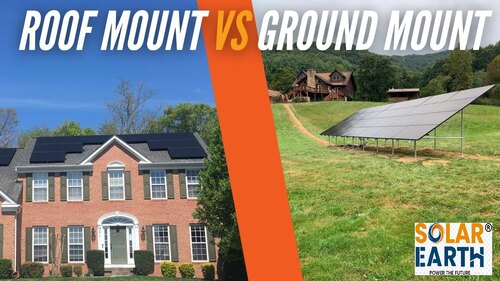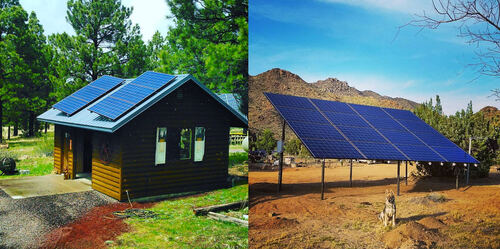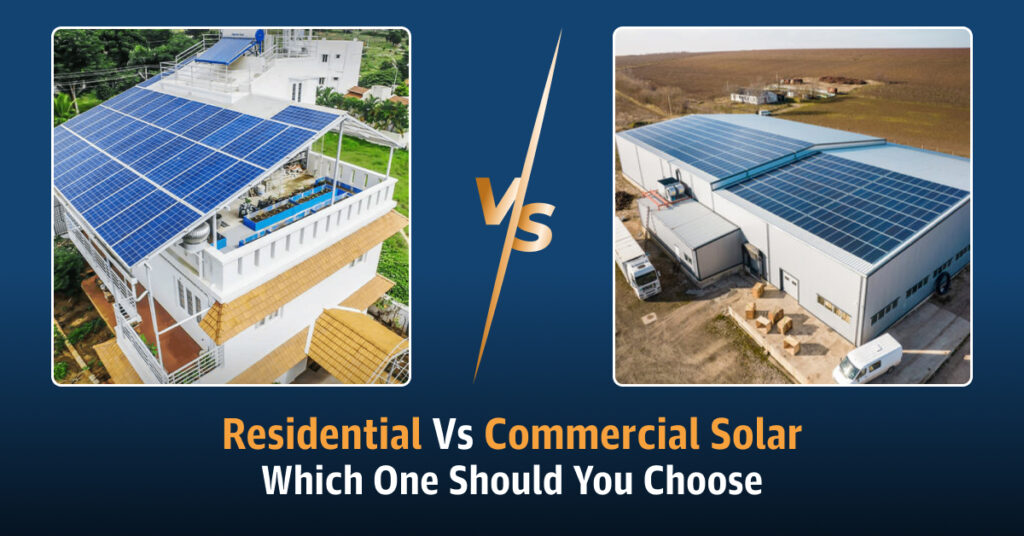As solar energy acceptance quickens worldwide, homeowners, businesses, and industries are handled with a significant question, Should they go for rooftop solar panels or ground-mounted solar systems? Both systems yoke sunlight to produce clean, renewable power, but they vary in design, installation, space requirements, and cost in India.
In this article, we will compare solar rooftop vs. ground-mounted solar systems to assist you in making a well-versed conclusion based on your energy requirements, budget, and property type in India.
Solar rooftop systems utilize existing building space, present a cost-effective solution perfect for urban homes and small businesses, though their capacity is limited by the accessible roof area and its physical integrity.
Contrarywise, ground-mounted solar systems necessitate devoted open land, which permits for higher energy generation due to ideal panel positioning and informal scalability, making them healthier suited for large-scale or industrial energy demands despite the advanced upfront investment.
-
Overview of Solar Rooftop and Ground-Mounted Systems
Rooftop Solar Systems
Rooftop solar panels are installed straight on the roof of a building, residential, commercial, or industrial. They utilize the idle space on the roof to produce electricity, making them perfect for urban areas with limited land accessibility.
Ground-Mounted Solar Systems
Ground-mounted systems are installed on open land, supported by frames or mounting structures secured to the ground. These are frequently used in large-scale installations like solar farms or in properties with plentiful vacant land.
-
Key Differences Between Rooftop and Ground-Mounted Solar

| Factor | Rooftop Solar System | Ground-Mounted Solar System |
| Space Requirement | Utilizes existing roof space | Requires open land area |
| Installation Cost | Lower installation and wiring costs | Higher cost due to mounting structures and site preparation |
| Efficiency | May be affected by roof angle, shading, or space | Higher efficiency due to optimal tilt and orientation |
| Maintenance | Difficult to access for cleaning or repairs | Easy access for maintenance |
| Scalability | Limited to roof size | Highly scalable—ideal for large installations |
| Cooling & Performance | Panels may heat up faster on roofs | Better air circulation improves performance |
| Aesthetics | Integrated and less obtrusive | Visible from a distance; may affect aesthetics |
| Permits & Regulations | Fewer permissions required | May need land use and environmental clearances |
-
Advantages of Rooftop Solar Systems
- Cost-Effective Installation: Since no land is mandatory, installation costs are usually lower.
- Space Utilization: Flawless for urban areas with limited ground space.
- Reduced Transmission Losses: Straightly associated with the building’s electrical system.
- Government Incentives: Numerous residential solar programs and subsidies sustenance for rooftop installations.
- Quick Installation: Easier and quicker to attach to existing structures.
-
Advantages of Ground-Mounted Solar Systems
- Higher Energy Production: Panels can be situated at the ideal tilt and direction for maximum sunlight.
- Easy Maintenance: Cleaning and servicing are simpler compared to rooftop systems.
- Scalable: Can effortlessly expand capacity by adding more panels.
- Ideal for Large-Scale Projects: Suitable for commercial or utility-scale solar farms.
- Cooling Efficiency: Panels remain cooler due to natural airflow, cultivating performance.

-
Disadvantages to Consider
Rooftop Solar
- Limited installation capacity based on roof size.
- Roof alignment or shading may decrease efficiency.
- Harder to maintain or replace components.
Ground-Mounted Solar
- Requires land convenience and preparation.
- Higher upfront cost due to extra mounting and cabling.
- May essential local permits or environmental clearances.
-
Cost Comparison
- Rooftop Solar: Installation naturally ranges from ₹45,000–₹65,000 per kW for residential setups.
- Ground-Mounted Solar: Costs are higher, around ₹60,000–₹85,000 per kW, depending on land and mounting structure.
However, ground-mounted systems often carry healthier long-term returns due to higher generation competence and easier expansion potential.
(Note : Consult your solar installer / dealer for prices)
-
Which One Should You Choose?
Your decision depends on space availability, budget, and energy goals.
- Select Rooftop Solar if you have limited land and wish a cost-effective, low-maintenance system for your home or office.
- Select Ground-Mounted Solar if you own big land parcels, plan to increase capacity in the future, or want a high-efficiency system for industrial or agricultural use.
A professional solar installer can conduct a site survey and endorse the best system configuration for your detailed requirements.
-
Environmental Impact
Both systems meaningfully decrease carbon emissions, serving you transition toward sustainable energy. However, ground-mounted solar farms can have a greater environmental footprint if land clearing or habitat disruption happens. Rooftop systems, on the other hand, make use of existing infrastructure, minimizing environmental influence.
Conclusion
Both rooftop and ground-mounted solar systems offer huge benefits for clean energy generation. Rooftop solar is a reasonable, space-saving solution for homes and small businesses, while ground-mounted systems deliver higher competence and scalability for bigger installations.
Finally, the best choice depends on your property type, available space, and long-term energy objectives. Investing in solar, whether on your roof or the ground, is a step toward energy individuality and a greener planet.
FAQs on Solar Rooftop vs. Ground-Mounted Systems
- Which system generates more electricity?
Ground-mounted systems usually produce more electricity due to healthier positioning and optimal angles.
- Is rooftop solar cheaper than ground-mounted solar?
Yes, rooftop solar is typically cheaper to install because it doesn’t necessitate land or complex mounting structures.
- Can I install ground-mounted solar at home?
Yes, if you have accessible land and local permissions, you can install a ground-mounted system for residential usage.
- Which system is easier to maintain?
Ground-mounted solar systems are easier to admittance, clean, and preserve.
- Do both systems qualify for government subsidies?
Yes, rooftop solar for residential and commercial use is typically subsidized, and ground-mounted projects may qualify for industrial or renewable energy incentives.
In Conclusion:
Whether it’s on your rooftop or on open ground, solar power is a clever investment for a supportable future. Appraise your property, budget, and energy goals and pick the system that carries the best long-term value.



